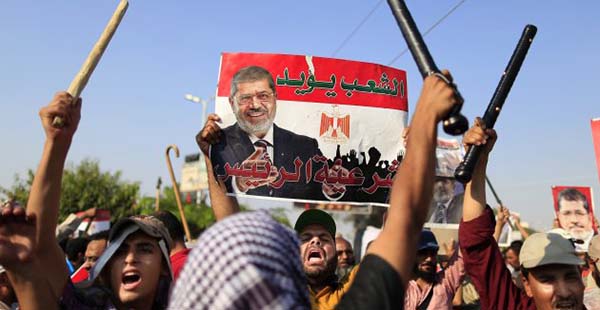On Dec. 25, a powerful blast rocked police headquarters in Nile Delta city where top security officials came together to work out arrangements for an upcoming constitutional referendum, leaving 15 people dead and more than 100 wounded. Soon, after the attack, Muslim Brotherhood condemned the attack with strong term and pointed finger towards those who want to crack the unity of Egyptians.
The blast brought down an entire section and side walls of the five-floor building. Dozens of parked cars and police vehicles were incinerated, and several nearby buildings were damaged, including a bank and theatre. Windows of nearby houses were shattered. An armed group named AnsarBeit Al Maqdis claimed the responsibility. Previously, the group also claimed most of the biggest attacks in the past months, including a failed attempt to assassinate the interior minister in Cairo in September. Only days earlier, the group threatened more attacks, saying it considers Egyptian troops and police to be infidels because they answer to the secular-leaning military-backed government.
Despite claiming responsibility, the anger of interim military-backed government flooded towards Muslim Brotherhood. Subsequently, top officials pointed fingers towards the group and branded it as a terrorist group which turns the worst page for the party during its 85 years of activism. Since the ouster of President Mursi, the first elected Islamist President in the history of country, supporters have not moved an inch back from their initial demand. They demand the restoration of President Mursi on his power, the thing which seems so unrealistic.
The Egyptian security forces that somehow stood neutral in the contest between regime of Hosni Mubarak and people who ousted his regime now have come to the center of contest between Islamists and non-Islamic groups. Perhaps no one will forget the historical footages that were televised from Tahrir Square where after the demand of ex-President Hosni Mubarak, Egyptian soldiers marched in but were silently watching tens of thousands of people who demanded economic reforms, democracy and ouster of authoritarian regime. People were hugging soldiers and shooting photos of memorials.
People were shouting that military was not on the side of the government but the side of people. everyone was talking about the popularity of the military because of their sacrifices made in war with Israel. Indeed, military’s non-intervention in bringing the situation under the control after call of President Mubarak was a major blow to the pillars of his power. He understood that he does not wield power and, hence, had to go away.
Thereafter, the situation moved to a direction that forced military commanders to take action. In order to bring the situation under the control, it formed an interim government which came under severe criticisms as both Islamists and non-Islamists groups commenced blaming it for illegally capturing power or possibly even preparing for a military government. All those claims proved baseless as it willingly handed power to Islamist government.
On the other hand, the struggle of secular groups bluntly failed. The votes casted in the favor of secular presidential nominees were not comparable to that of President Mursi’s – the nominee of Muslim Brotherhood. In spite of huge support it received from Egyptians, many were irritated saying that the revolution was stolen. They claimed that that those who marched into streets and stood against the former regime were not Islamists, nor they wanted to establish the government of Allah on the earth but youngsters who wanted to establish a democratic system in the country, with functional transparent economic system which benefit all Egyptians, not only those who were in the power. They maintained the rise of Islamists group on the power necessarily led to yet another authoritarian regime. Indeed, the secular dictatorship of previous regime comparably can be good because a religious dictatorship would appear far more oppressive.
Thus, unlike optimism that popped up after the ouster of President Hosni Mubarak regime, the Islamist government could not restore peace and stability. On one hand, it was not able to counter the protesters with clinched fist due to shaky pillar of its power, on the other hand, was not willing to succumb to demands of secular groups. Meanwhile, President Mursi tried his best to bring the situation under the control through calling his opposition for dialogue. But the oppositions and protestors mounted pressure and asked that his government should accept their demands without any condition. They rejected the continuous call of President Mursi for negotiation, considering that the Islamist government might try to crack their unity.
Several issues including the draft of constitution which, opposition claim, contradicts the principles of democracy and larger authority for President. These two issues along with failure of the government to meet the economic demands of Egyptians paved the way for new round of civil uprising.
The intervention of military has further complicated the situation. On one hand, the international community has remained dumb of how to deal with a military government which has ousted an elected civil government on the other hand, it does not seem probable that the restoration of President Mursi would solve the problem; and it is impossible to restore him to power considering the present political situation.
Now military has put its feet on the accelerator and wants to weaken the Brotherhood to a level that it may never rise to a level to challenge the military hegemony or secular groups. No doubt, such inflexibility against the group will strengthen the fronts of radical groups who from the very start were against democratic way for achieving their objectives. The radical layers of Brotherhood and other Islamist groups might embark to armed struggle against government which would be horrific.

